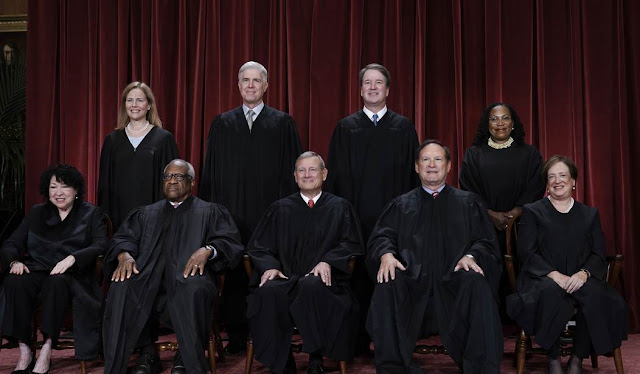LTP News Sharing:
AP Photo/J. Scott Applewhite, File
The Supreme Court dealt another blow to the Biden administration with its decision in Biden v. Nebraska on Friday when it ruled 6-3 that the president’s attempt to “forgive” student loan debt through the HEROES Act was impermissible and could not move forward — while also unanimously deciding to toss another challenge to Biden’s student debt bailout brought by individual borrowers due to a lack of standing to bring their case.
In the majority opinion from Chief Justice Roberts and joined by Justices Thomas, Alito, Gorsuch, Kavanaugh, and Barrett, the Court states in Biden v. Nebraska:
Last year, the Secretary of Education established the first comprehensive student loan forgiveness program, invoking the Higher Education Relief Opportunities for Students Act of 2003 (HEROES Act) for authority to do so. The Secretary’s plan canceled roughly $430 billion of federal student loan balances, completely erasing the debts of 20 million borrowers and lowering the median amount owed by the other 23 million from $29,400 to $13,600… Six States sued, arguing that the HEROES Act does not authorize the loan cancellation plan. We agree…
The Secretary asserts that the HEROES Act grants him the authority to cancel $430 billion of student loan principal. It does not. We hold today that the Act allows the Secretary to “waive or modify” existing statutory or regulatory provisions applicable to financial assistance programs under the Education Act, not to rewrite that statute from the ground up.
Putting an even finer point on things, Roberts writes that the “Secretary’s plan has ‘modified’ the cited provisions only in the same sense that ‘the French Revolution ‘modified’ the status of the French nobility’—it has abolished them and supplanted them with a new regime entirely.”
In the majority opinion’s conclusion, the chief justice defended the Supreme Court amid a new wave of disingenuous attacks from President Biden, congressional Democrats, and leftist activists:
It has become a disturbing feature of some recent opinions to criticize the decisions with which they disagree as going beyond the proper role of the judiciary. Today, we have concluded that an instrumentality created by Missouri, governed by Missouri, and answerable to Missouri is indeed part of Missouri; that the words “waive or modify” do not mean “completely rewrite”; and that our precedent—old and new—requires that Congress speak clearly before a Department Secretary can unilaterally alter large sections of the American economy. We have employed the traditional tools of judicial decision making in doing so. Reasonable minds may disagree with our analysis—in fact, at least three do… We do not mistake this plainly heartfelt disagreement for disparagement. It is important that the public not be misled either. Any such misperception would be harmful to this institution and our country.
Justice Elena Kagan authored the dissenting opinion and was joined in her objections by Justices Sotomayor and Jackson.
The Court’s decision on Friday should be unsurprising to Democrats, especially President Biden: he, along with former House Speaker Nancy Pelosi (D-CA) previously made statements that acknowledged the federal government lacks the authority to erase student debt by passing the costs around to all taxpayers.
Several of President Biden’s other policies have faced similar fates before the highest court in the land, with his vaccine mandate for private employers, his eviction moratorium, and his EPA policy seeking to regulate carbon emissions from power plants all being struck down by the Supreme Court.






